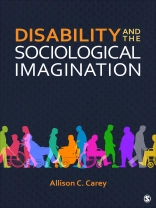Disability and the Sociological Imagination provides an expertly developed and accessible overview of the relatively new and growing area of sociology of disability. Written by one of the field’s leading researchers, it discusses the major theorists, research methods, and bodies of knowledge that represents sociology’s key contributions to our understanding of disability. Unlike other available texts, it examines the ways in which major social structures contribute to the production and reproduction of disability, and examines how race, class, gender, and sexual orientation shape the disability experience
Tabela de Conteúdo
Part 1 Building Blocks of the Sociology of Disability
Chapter 1 Introducing the Sociology of Disability and Theoretical Perspectives
Chapter 2 Researching Disability
Chapter 3 Social Constructions of Disability Through Time and Place: A Brief History
Part II The Complex Experience of Disability
Chapter 4 Ableism and Inequality
Chapter 5 Culture and Disability
Chapter 6 Disability Identity and Socialization
Chapter 7 Intersectionality: Gender, Sexuality, and Race
Part III Macro Social Structures and Disability
Chapter 8 Family through the Life Course
Chapter 9 Economy and Politics
Chapter 10 Health Care
Chapter 11 Education and Criminal Justice
Chapter 12 Social Movements and Social Change












